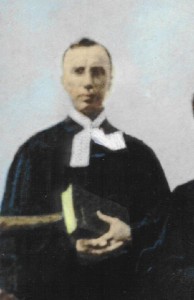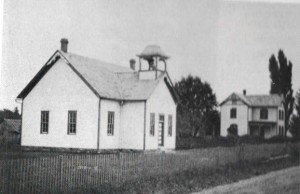The following narrative was written by Rev. Reuben Valentine Smith in 1955. It is his personal account of his experiences as a pastor at Zion Evangelical Lutheran Church, Chattanooga, Ohio, from 1899-1905.
How I Came to Chattanooga
It is my belief that Providence directs our lives and that God rules His Church, although the human factors by which His Will is carried out often do their part imperfectly and at times even perversely. Yet I do not think that it was by mere chance that I was called to Zion’s Church at Chattanooga.
There had been some trouble in the congregation arising chiefly from the introduction of English services, and the pastor had accepted another call. So the officers had written to Rev. Philip Schmidt, who had been their pastor many years before. He was then at Grove City, near Columbus, a friend of mine but not a relative. He recommended me, and the congregation sent me the call. The remuneration was to be $350.00 a year, parsonage, fuel and horse feed. Twenty cords of good beech wood were neatly piled up along the drive. I did not have a wife and I never owned a horse, but I could live in the parsonage. I accepted the call.
On a Saturday afternoon in June 1899, I rode my bicycle out from Celina, set up my bed in the parsonage and was installed the next day. When the members saw me they were sorely disappointed. I was twenty-two years old and did not look more than nineteen; I was not the least bit impressive in size and quite evidently a town boy. They were puzzled over the choice Rev. Schmidt had made, but their doubts and misgivings were dispelled in a practical way.
The deacons had planted about half of the parsonage lot in corn and had not done anything to it since. It was the end of June and the corn was about knee high and the weeds were higher. As a boy I had spent several weeks every summer on the farm of my great-uncle. (It is now the airport of Columbus.)
At breakfast on Monday morning, wishing to show off my knowledge of farming to Mr. Becher, I remarked that the corn ought to be plowed. He saw how much of a pretense that remark was and he called my bluff by saying: “Why don’t you plow it?” I refused to be intimidated and came back with “I would, if I had a horse and a plow.” Mr. Becher capped that by offering the use of a horse and plow, and the result was that the first bit of pastoral work that I did in my first charge was the plowing of a corn patch.
The next few mornings I also cleaned up the garden and the lawn. When the members came to church on the following Sunday and learned that I had done the work myself it created somewhat of a sensation and removed their misgivings about my ability to adapt myself to country life.
The School
The church council was holding its meeting on the lawn on a warm evening late in June. Various matters had been discussed when one of the members said, “Reverend, when are you going to start the school?” I said, “What school?” The answer was “Our preacher teaches a German school for our children every summer.” My reply was,”There is nothing about a school in the call.” They said, “Oh yes there is. It says ‘the pastor is to take care of the instruction of the young’.” I had thought that this meant catechetical instruction such as I had given. They told me that it meant that I was to teach school several months every summer; that I could take it easy–three half days a week would be enough.
It was a good thing that we were sitting in the dark and the expression on my face was not visible. My reply was that three half days a week would be only a mockery of a school; that if they really wanted an effective school I would give them one: five days a week, full time from July to Christmas, and in alternate years the catechumens would go on until Easter. What a job I was wishing on myself! They enthusiastically promised that they would see to it that the children would attend. So, that arrangement was accepted and carried out for the six years of my incumbency.
The school house was something–it was an old building about 28 by 14 feet. Some of the weather boarding was loose and part of the plastering was cracked. Instead of desks and seats there were old oaken benches with writing boards, each bench seating four pupils. There was an old box stove and a small reed organ. Later, largely through the kindness of Mr. and Mrs. Herzog, we got an adequate building.
But we had a real school. The children came, an average of 35 to 40 a day, ages 6 to 14. They kept me busy. It was a new experience and a challenge for me. I read books on teaching methods and did my best. I believe to this day that my hard work was not wasted and that the school was a real blessing to the congregation.
Incidentally, we also had fun. The boys helped me harvest the corn and I bought some equipment and we, including me, played baseball and football. This shocked some of the older members, but the youngsters liked it. One of the boys who was with us a part of the time later did quite well in professional baseball.
To be continued next week.
The Rev. Dr. Smith was born 14 February 1877 in Columbus, Ohio, to Benjamin L. and Mary Ann (Poth) Smith. He graduated from Capital University in 1896 and from the ELT Seminary in Columbus in 1899. He served at Zion, Chattanooga, from 1899-1905 and at a church in Marion, Indiana, from 1905-06. He returned to Columbus and became a college professor and Dean of Classic Language at Capital University from 1906-1955. He completed nearly fifty years of uninterrupted teaching and missed only two days of classes during that time. He was married to Nora Mangold. Rev. Smith died of a sudden heart attack in Columbus on 18 November 1955 at the age of 78.




1 comment
This is very interesting, looking forward to ” rest of the story”. Kate